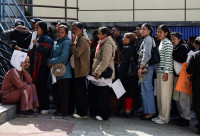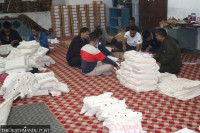National
International rights bodies, UN welcome Supreme Court decision on transitional justice
Government should now amend the law to comply with the verdict, they say.%20(6).jpg&w=900&height=601)
Binod Ghimire
Four international human rights organisations and the Office of the United Nations High Commissioner for Human Rights (OHCHR) have welcomed the Supreme Court’s decision to reject a government petition to review its landmark verdict on transitional justice.
The decision is an important step towards securing truth, justice and reparations for thousands of victims of the decade-long Maoist insurgency, they said.
Following the decision, the government now needs to revise the existing transitional justice law as per the court’s order ensuring justice to the victims of conflict-era abuses, said Amnesty International, TRIAL International, International Commission of Jurists and Human Rights Watch, in a statement on Friday,
In a separate statement Rupert Colville, spokesperson for OHCHR, said the court’s decision reconfirms that the only way for the government to credibly proceed with the transitional justice process is to abide by key human rights and transitional justice principles reflected in the 2015 court ruling, including the centrality of victims and the importance of accountability for serious violations. “Victims' advocacy groups and civil society members have welcomed the court's decision, and so do we,” he said.
The apex court on April 26 rejected the government’s plea, registered in April 2015, that sought a revision of a verdict issued by a five-member special bench led by then chief justice Kalyan Shrestha in February that year. The 2015 verdict had ordered the government to amend the Enforced Disappearances Enquiry, Truth and Reconciliation Commission Act-2014.
The court had ruled that the law had to be amended as it failed to adhere to the principles of transitional justice and related international practices. The bench struck down almost a dozen of provisions in the law and directed the government to ensure that amnesty isn’t granted in cases of serious human rights violations committed during the decade-long insurgency.
“With its latest ruling the Supreme Court has upheld the principle that there can be no amnesties for those suspected of criminal responsibility for crimes under international law and human rights violations. More than 13 years since the Comprehensive Peace Agreement of November 2006 promised justice to the victims, no one has been held accountable for any conflict-era crimes,” said the statement.
The four human rights organisations said the court has made it clear that there can be no further excuse for the government to backslide on ensuring truth, justice, reparations and guarantees of non-recurrence.
“The request filed by the Nepal government to review the decision of the Supreme Court was another attempt to evade the real issue: accountability for mass human rights violations. We are delighted that the Supreme Court held its ground and reaffirmed the importance of fair and efficient transitional justice mechanisms,” said Cristina Cariello, the Head of Nepal Program at TRIAL International, in the statement.
Amnesty International, the International Commission of Jurists, Human Rights Watch and TRIAL International have repeatedly been expressing concerns about the faltering transitional justice process. While the government has failed to amend the law to uphold basic principles of justice, there have been long delays and repeated political interferences in appointments of office bearers to the two transitional justice commissions.
An effective transitional justice system requires strong legal foundations consistent with international law and standards, and the political will to address the demands of victims of the conflict, the organizations said.
“When Nepal stood for election to the United Nations Human Rights Council the government promised to uphold its human rights obligations, but three years later, as it seeks re-election, there has been nothing but impunity and evasion on transitional justice,” said Meenakshi Ganguly, South Asia director at Human Rights Watch. “These are crimes under international law, subject to universal jurisdiction, and if justice is denied at home victims may take their cases abroad.”




 20.9°C Kathmandu
20.9°C Kathmandu














